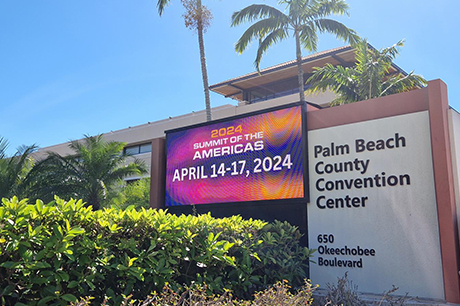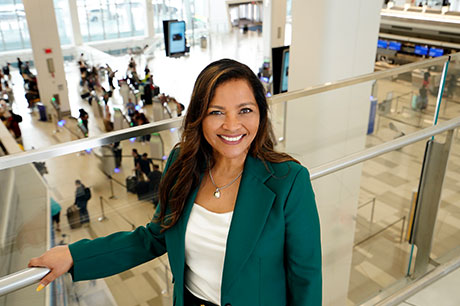Dufry reports organic growth of 3% for 2019 as Covid-19 action plan kicks in
By Charlotte Turner |

Julián Díaz (left) and Heathrow CEO, John Holland Kaye (right) will be working closely to mitigate losses in 2020 due to Covid-19, while working on the implementation of changes to the duty free structure following Brexit.
The world’s largest duty free & travel retailer, Dufry Group registered organic growth of 3% in 2019, boosted by strong performances in Europe (particularly the UK and Spain), Africa and Asia, while turnover grew 1.9% to reach CHF 8,848.6 million/$9,428m in 2019.
Julián Díaz, CEO of Dufry Group, said that Dufry’s ‘ongoing acceleration of organic growth’ in 2019 had been supported by the company’s marketing initiatives and new concessions.
“Organic growth has been benefitting from both solid contributions from new concessions and like-for-like growth, which turned positive in Q3 reaching 1.3% and increasing to 2.3% in Q4,” he added.
However, the company has revealed revenues saw a decline of -7.3% in February. Whilst Europe and Africa saw marginal losses, Asia Pacific and the Middle East reported declines in double digit. North America was negative in single digits, while Central and South America saw positive growth. Year-to-date until the end of February, Dufry registered ‘organic growth of -2.3%; year-to-date until 8 March, organic growth was -3.8%’.
COVID-19 IMPACT
“At the beginning of 2020, we saw a further acceleration of the business,” said Díaz. “Then Covid-19 impacted our operations where we have exposure to Asian customers as well as in locations directly impacted by the phenomena.
“We have immediately implemented several worldwide initiatives to accelerate sales; to secure cash generation through renegotiations of rents and with brands, and to reduce costs through actions at third party cost levels and with employee reorganisations. Currently it’s still challenging to estimate the impact for the full year.”
The company has immediately set up a special committee at the Global Executive Committee level and implemented an action plan to secure cash flow generation, drive sales and safeguard profitability.
The action plan is reportedly monitored on a weekly basis and includes initiatives to accelerate sales volumes, maintain gross profit margin levels, reduce personnel and other expenses, as well as renegotiate rents.
Moreover, measures to offset cash flow impacts have been launched at capex and net working capital level expected to generate in total a contribution of CHF 40.0m/$42.6m in the full-year.
“Considering the planned savings at adjusted operating profit level as well as the self-help measures at NWC and capex levels, we do not anticipate any liquidity problems during the crises,” added Díaz.
NEGATIVE SINGLE-DIGIT FOR 2020
Provided that the situation improves in the second semester and considering that the third quarter is the most important for the company, Dufry expects to reach a negative, single digit organic growth performance for the full-year 2020, “based on current information,” said the company.

Julián Díaz pictured with Heathrow CEO, John Holland Kaye and WDF CEO Fred Creighton at the opening of the company’s Next Generation Store in Terminal 3 of London Heathrow Airport.
In total these initiatives are expected to generate savings of CHF 60.0m/$64m on a consolidated full-year basis.
The largely positive performance in 2019, however, was said to be driven by the company’s new commercial platforms as well as its ongoing refurbishment programme covering 41,600sq m of retail space mainly in Spain, Sweden, Jordan and Turkey.
Dufry increased its gross retail space by 33,900sq m in 2019, with the opening of new shops in Russia, Mexico, Kuwait, Brazil and onboard several ships. It had already signed around 14,900sq m to be opened in 2020 and 2021 in existing and new locations across the globe.
“In 2019 we achieved several milestones such as [our acquisition] in Russia, consolidating our position in the country, and the two acquisitions in the United States through our Hudson subsidiary,” he added. TRBusiness speaks exclusively to Hudson CEO, Roger Fordyce inside the March issue of TRBusiness. To subscribe to the magazine, click here.
OPTIMISM IN THE LONG-TERM
“Here we created additional growth opportunities allowing us to expand both in duty paid and duty free, while at the same time accelerate the penetration of the important airport F&B market.
“Last but not least, we successfully extended the AENA contract for up to five years covering all the airports in Spain. I am looking forward to rolling out to further locations in Spain our successful commercial initiatives and best practices already tested across five pilot airports to accelerate performance even more. It’s worth to note that this implementation will not need any significant capex investment.”
 Díaz said he remained ‘optimistic’ about Dufry’s ability to deliver mid- and long-term sustainable growth and solid cash flows with its ‘resilient business model’.
Díaz said he remained ‘optimistic’ about Dufry’s ability to deliver mid- and long-term sustainable growth and solid cash flows with its ‘resilient business model’.
Of the 3% organic growth recorded in 2019, like-for-like sales contributed 0.6% and net new concessions, 2.4%.
Changes in scope, which includes the contribution of the acquisitions of Vnukovo and Brookstone, amounted to 0.1%. The translational FX effect in the period was -1.2% as a net effect of the strengthening of the US dollar and weakening of the Euro and the British Pound.
In the fourth quarter, all divisions reported positive organic growth resulting in a Group performance of 3.1% supported by a healthy like-for-like growth of 2.2%.
Turnover in Europe and Africa reached CHF 3,850.9m/$4.1bn in 2019, up 5.8% in the year and 7.5% in the fourth quarter. The like-for-like contribution remained strong during Q4, reaching 6.1%.U
UK AND SPAIN
The UK and especially Spain continued to deliver solid performance for the year. The implementation of the pilot projects across five Spanish airports including several commercial initiatives and best practices were ‘very successful’, said Dufry, ‘showing improving sales during the whole year’.
Greece and especially Turkey maintained their positive momentum in 2019, delivering solid growth. Other locations such as Malta, Italy and Finland also posted positive growth, while Africa saw a stronger performance in most operations, with Morocco, Kenya and Egypt growing double-digits in the year.
For its operations in Asia Pacific and the Middle East, Dufry’s turnover reached CHF 1,274.9m in 2019, up from CHF 1,153.6m in 2018. Organic growth for the year stood at 10.8% supported mainly by the contribution of new concessions in 2019. “It’s worth highlighting that the like-for-like performance also improved during the year, reaching 8.3% in the fourth quarter,” said Dufry.
Eastern Europe posted positive performances, supported by Russia and Serbia. Asia Pacific posted double-digit growth mainly driven by Hong Kong with the successful opening in the MTR high-speed railway station, as well as the strong performance seen in Macau and the positive growth in Cambodia and China. Australia also posted solid performance for the year, supported by the opening of new shops in Perth. The Middle East enjoyed a good performance, with solid growth in India, Sri Lanka and Sharjah.
NORTH AMERICA +1.8%
In North America, turnover amounted to CHF 1,935.8m compared to CHF 1,884.4m in 2018 and organic growth came in at 1.8% for 2019. The North American operation has been performing strongly for many years and in 2019 the duty paid business confirmed its resilience despite some temporary challenges. The duty free segment was negatively impacted by the lower spending from Chinese passengers along the first nine months, but showed signs of a recovery in the fourth quarter 2019.
In Central and South America turnover stood at CHF 1,536.1m in 2019 versus CHF 1,617.0m in 2018. Organic growth in the region was -6.3% in the year with performance in the fourth quarter turning positive at 0.2%, mainly supported by the implementation of commercial initiatives.
SOUTH AMERICA ‘REMAINED CHALLENGING’ IN 2019
During 2019, performance in South America remained challenging, impacted by local currency devaluations, namely in Brazil and Argentina. Performance in Mexico was positive throughout the year, reaching solid results especially during the fourth quarter. The Dominican Republic posted positive growth, while the Caribbean was healthy along the year, supported by the cruise business.
“Worth mentioning are the two positive changes in legislation approved by the Brazilian government during 2019 – the possibility to open border shops and the increase of the arrival duty-free allowance – which will further support organic growth in this important market in South America,” added Dufry.
The Basel-based retailer was also keen to highlight the continued complexities they encountered due to a new reported framework.
“Given the introduction of IFRS 16 in 2019, most lines of the Income Statement and the KPIs became non-comparable with 2018 reported figures; except for the KPIs related to cash flows.”
[On its corporate website, Dufry has provided more information with comparative data by quarter and for FY 2018.]
As mentioned previously, Dufry started to report under the new IFRS 16 framework, which mainly changes the accounting treatment of leases. In short, whilst previously leases were accounted as expenses, now fixed components are capitalized and amortized over the lifetime of the contract, while all variable components of the concessions are classified as lease expenses. For 2019, Lease Expenses amounted to CHF -1,372.9m.
CHALLENGES BROUGHT BY IFRS FRAMEWORK
Speaking on this topic with TRBusiness back in October, Díaz emphasised just how much of a challenge reporting under this new framework had become.
“This is the most important change that happened in any of the companies I have worked for during my life. The IFRS 16 standard is having a tremendous impact on commercial leases…the reality is that we are not building nuclear plants, we are not leasing aircrafts. What we have is a shop that is a very cheap investment in theory and the asset is really a contract.”
Díaz explained that the new methodology is heavily impacting companies in the concession business, especially those involved in travel retail.
“I don’t want to be very specific, because it is very technical, but if you have a concession contract of 10 years, during the first five years you are extra penalised due to the accounting system.
“During that initial period you are accruing more expenses than the contract is telling you and during the second part of the contract you are accruing less expenses. The profitabilities move forward.”
OUT NOW: March/April Leading Americas Operators
The TRBusiness March/April 2024 edition boasting the inimitable leading Americas Operators...
IAADFS evolves; Americas summit to move to Miami
The International Association of Airport and Duty Free Stores (IAADFS) has adopted a new...
DFWC Q1 2024 KPI Monitor indicates rise in duty free impulse purchases
Impulse purchasing within global duty free is on the rise, according to the latest Duty Free...
-
 International,
International,OUT NOW: March/April Leading Americas Operators
-
 International,
International,IAADFS evolves; Americas summit to move to Miami
-


In the Magazine
TRBusiness Magazine is free to access. Read the latest issue now.

 Trbusiness. The travel retail Trbusiness. The magazine for global retail and duty free professionals.
Trbusiness. The travel retail Trbusiness. The magazine for global retail and duty free professionals.
























